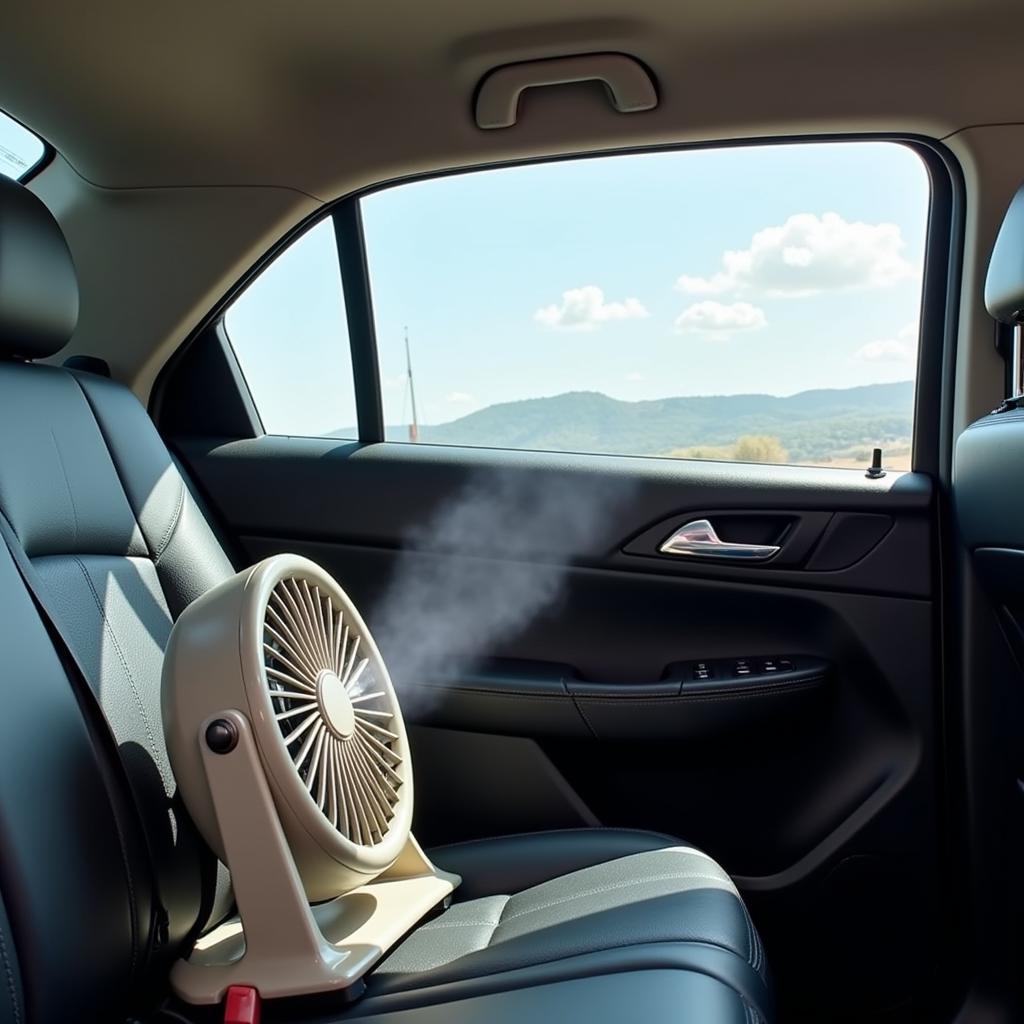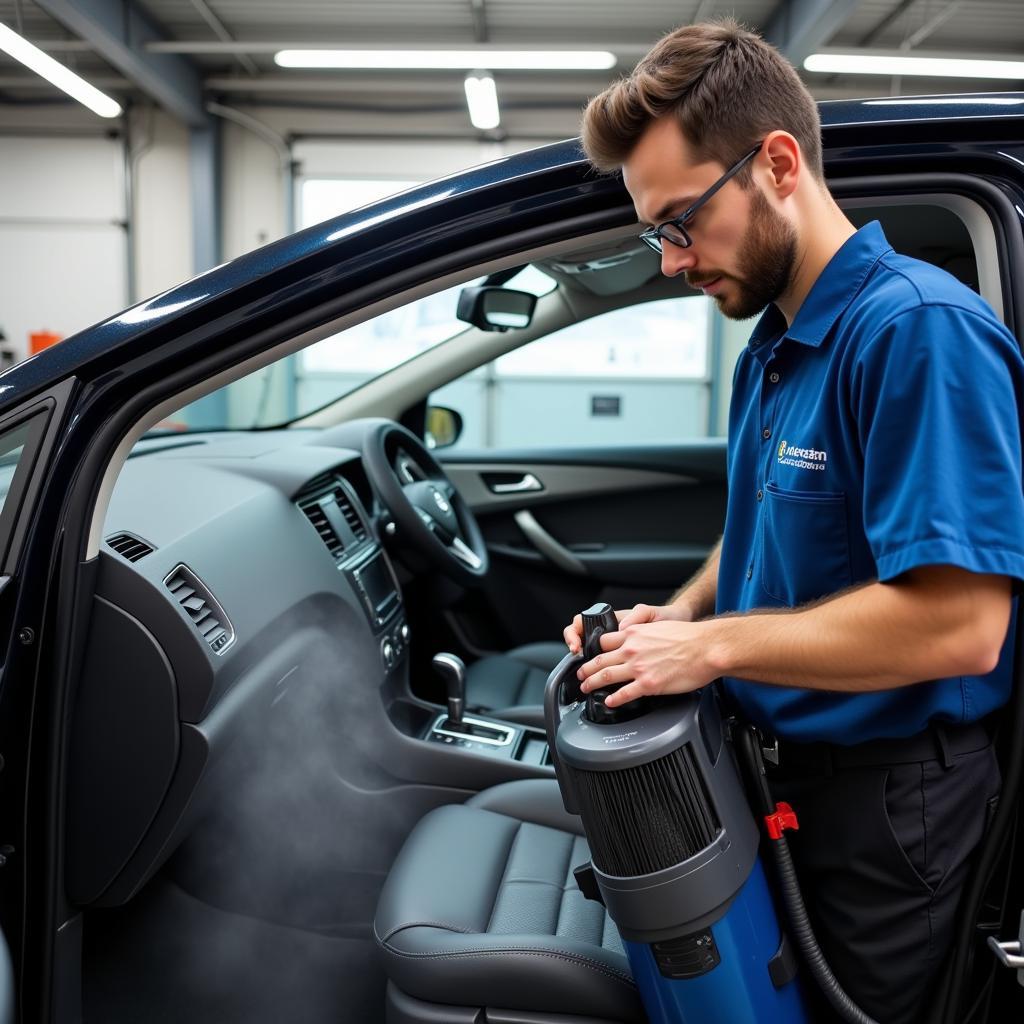That “new car smell” after a detailing session can be intoxicating, but sometimes it’s a bit too much. If you’re wondering How To Get Car Detailing Chemical Smell Out of your vehicle, you’re in the right place. This article will cover everything you need to know about banishing those lingering fumes and enjoying a fresh, clean car.
 Removing Lingering Chemical Odors After Car Detailing
Removing Lingering Chemical Odors After Car Detailing
Understanding the Source of the Smell
Before tackling the smell, it’s important to understand where it comes from. Detailing products, while designed to clean and protect your car, often contain volatile organic compounds (VOCs). These VOCs are the primary culprits behind that strong chemical odor. Different products, from interior cleaners and protectants to leather conditioners, contribute to the overall smell. Identifying the specific product causing the most potent odor can help you choose appropriate removal methods. For instance, a strong leather conditioner smell might require different treatment than an overpowering air freshener scent. Remember, even “natural” or “eco-friendly” products can still contain VOCs and leave a lingering smell.
After a complete detail, knowing what products were used is key. Check your receipts, or if you detailed the car yourself, review the products you used. This information will be invaluable in determining the best course of action. Sometimes, the smell isn’t from the detailing chemicals themselves, but from something they reacted with in your car, such as old stains or previous cleaning products. what you need for interior car detailing will give you insight into the typical products used.
Effective Methods for Removing Car Detailing Chemical Smell
Ventilation: Your First Line of Defense
The simplest and often most effective way to get rid of detailing chemical smells is good old-fashioned ventilation. Open all your car doors and windows for several hours, preferably in a shaded area to prevent direct sunlight from damaging your interior. Consider parking your car in a garage with the garage door open for enhanced airflow if weather conditions aren’t ideal. A gentle breeze can significantly accelerate the process. This is particularly useful for smells emanating from fabric upholstery and carpets, which tend to absorb odors.
 Ventilating a Car to Remove Chemical Odors
Ventilating a Car to Remove Chemical Odors
Activated Charcoal: A Natural Odor Absorber
Activated charcoal is a powerful odor neutralizer. Place small bowls or bags of activated charcoal throughout your car, particularly in areas where the smell is strongest. You can find activated charcoal online or at most pet stores. Replace the charcoal every few days until the smell is gone. This method is especially helpful for stubborn odors that linger even after ventilation.
Baking Soda: An Affordable Odor Eliminator
Baking soda is another readily available household item that can help absorb odors. Sprinkle baking soda liberally on your car’s carpets and upholstery, let it sit for several hours, and then vacuum it up. This is a safe and effective way to neutralize mild odors and freshen up your car’s interior.
Ozone Generators: A More Powerful Solution
For particularly persistent smells, consider using an ozone generator. Ozone generators can effectively eliminate even the most stubborn odors, but they should be used with caution. Follow the manufacturer’s instructions carefully and ensure the car is completely empty of people and pets during the ozone treatment. After the treatment, ventilate the car thoroughly before entering.
Professional Detailing Services: When All Else Fails
If you’ve tried everything and the smell persists, it might be time to consult a professional detailing service. They have specialized tools and techniques to remove stubborn odors and can often pinpoint the source of the smell more effectively. how to detail cars interrior provides information on professional detailing.
 Professional Car Detailing for Odor Removal
Professional Car Detailing for Odor Removal
Preventing Future Chemical Smells
- Choose low-VOC products: Look for detailing products specifically labeled as low-VOC or VOC-free.
- Use products sparingly: Applying more product than necessary doesn’t necessarily result in a cleaner car, but it can definitely contribute to a stronger smell.
- Ventilate during and after detailing: Keep your car well-ventilated while detailing and for several hours afterward. can inhaling too much car quick detailer harm you explains the importance of ventilation.
- Allow sufficient drying time: Give all products ample time to dry completely before closing up your car.
Conclusion
Getting rid of that lingering car detailing chemical smell can be a challenge, but with the right approach, you can enjoy a fresh, clean car without the overpowering fumes. Remember, prevention is key. By choosing low-VOC products, using them sparingly, and ventilating your car thoroughly, you can minimize the chances of dealing with strong chemical smells in the future. How to get car detailing chemical smell out of your vehicle is a common question, and by following these tips, you can ensure a pleasant and odor-free driving experience. For more details on car care, you might be interested in what consists of a complete detail of a car or how to detail new car paint.
FAQ
-
How long does it take for car detailing chemical smell to go away? It can take anywhere from a few hours to several days, depending on the products used, the amount applied, and the ventilation methods employed.
-
Is the car detailing chemical smell harmful? While most detailing products are safe when used as directed, prolonged exposure to high concentrations of VOCs can be irritating. Always ventilate your car thoroughly.
-
Can I use air fresheners to mask the chemical smell? It’s generally best to avoid masking the smell with air fresheners, as this can create a mixture of scents that is even more unpleasant.
-
What are some low-VOC car detailing products? Many brands now offer low-VOC or VOC-free options. Look for products specifically labeled as such.
-
How often should I detail my car? This depends on your driving habits and environment. A general guideline is to detail your car every 3-6 months.
-
Can I detail my car myself? Absolutely! There are many resources available online and in stores to guide you through the process.
-
What should I do if the smell persists even after trying all these methods? If the smell is particularly stubborn, it’s best to consult a professional detailing service.
For further assistance, consider exploring other articles on our website, or contact us via WhatsApp: +1(641)206-8880 or Email: [email protected]. Our customer support team is available 24/7 to answer your queries.

Leave a Reply